- About Us
- Columns
- Letters
- Cartoons
- The Udder Limits
- Archives
- Ezy Reading Archive
- 2024 Cud Archives
- 2023 Cud Archives
- 2022 Cud Archives
- 2021 Cud Archives
- 2020 Cud Archives
- 2015-2019
- 2010-2014
- 2004-2009
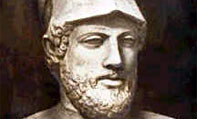 |
Examining The ‘Hero’ In Democracy |
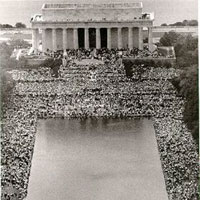
At a time when democracy, democratic values and leaders of democratic nations are so under the microscope throughout the world, this month Jeff McCready offers a back-to-basics perspective on the subject of hero figures in democracy, with particular focus on Yoshino Sakuzo and Martin Luther King, Jr.
A democratic ‘hero’ should, obviously, stand as a champion of the democratic ideal. This hero would maintain the importance of individual rights and freedoms, the need for accountable, participatory government, and would generally endeavor to preserve or promote a liberal-democratic system. In a strict sense, it might be argued by a democratic theorist that democracy does not need heroes, based on the proposition that a precisely implemented democracy would allow the effective operation of the system without the need for ‘heroes’ to precipitate its establishment or to encourage its continuation. In a pragmatic approach, however, and based upon the historical experiences of, as example, Japan and the United States, democratic heroes have played a critical role in furthering democracy. Yoshino Sakuzo and Martin Luther King, Jr., respectively, were critical in the formation and development of democracy in their countries, and stand as models and champions of democracy. Without the contributions of these individuals democracy may not have progressively developed as it did, and for their additional importance in rallying support for democracy these ‘heroes’ were most certainly a ‘necessity’ for advancement.
The United States in the 1950's was a democracy founded on libertarian ideals and the sovereignty of the people, as enunciated in the 1787 Constitution and Bill of Rights. These rights and freedoms were not enjoyed, however, by all citizens; most specifically the black population, which in many ways was still hindered from the privileges that all Americans had supposedly been assured as their ‘God given rights’. The situation prompted the increased mobilisation of the African-American population (particularly of those in the South) towards greater active opposition and protest against racism during this period, especially that which was institutionalised. Discrimination and the restriction of individual human liberties was a serious and contentious issue in the United States, and the problem highlighted such an unjust and incomplete application of democratic privileges that an entire movement (i.e. the civil rights movement) and leader or ‘hero’ that could stand as a protector and advocate of democracy were necessary for the beneficial progress of democracy in the United States. One of the most influential and recognised heroes of this period was Martin Luther King, Jr.
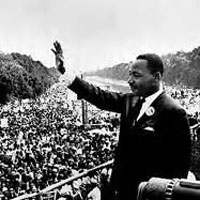 Martin Luther King, Jr., as represented by his achievements in the Montgomery Bus Boycott of 1955-56; his work in the Southern Christian Leadership Conference; his famous March on Washington and "I Have A Dream Speech" of 1963, and the landmark Civil Rights Act of 1964, never lost faith in the capacity and potential of American democracy to fulfill its 1787 promises. King attempted to epitomise and realise the democratic aspirations of black Americans, practicing Gandhian non-violent ‘satyagraha’ methods, encouraging political education of the masses, and pairing democratic and Christian ideals as the basis of his attempts to reform rather than overhaul the American democratic system so that it granted broader democratic opportunities and equalities for African-Americans. Since King proved to be so effective in furthering the cause of general human rights, and because he was one of the first African-Americans (especially in the South) that succeeded in achieving considerable socio-political reform, he was regarded by many as a ‘hero’ of democracy, and was integral in broadening the scope of the system to fulfill the democratic ambitions of the greater population.
Martin Luther King, Jr., as represented by his achievements in the Montgomery Bus Boycott of 1955-56; his work in the Southern Christian Leadership Conference; his famous March on Washington and "I Have A Dream Speech" of 1963, and the landmark Civil Rights Act of 1964, never lost faith in the capacity and potential of American democracy to fulfill its 1787 promises. King attempted to epitomise and realise the democratic aspirations of black Americans, practicing Gandhian non-violent ‘satyagraha’ methods, encouraging political education of the masses, and pairing democratic and Christian ideals as the basis of his attempts to reform rather than overhaul the American democratic system so that it granted broader democratic opportunities and equalities for African-Americans. Since King proved to be so effective in furthering the cause of general human rights, and because he was one of the first African-Americans (especially in the South) that succeeded in achieving considerable socio-political reform, he was regarded by many as a ‘hero’ of democracy, and was integral in broadening the scope of the system to fulfill the democratic ambitions of the greater population.
Yoshino Sakuzo played an important role in defining and formulating democratic theory and student political activism during the Taisho period (1912-26) in modern Japan. Prior to this period democratic thought was still only in a relatively early stage of development and rationalisation, and the new governments of the post-Meiji Restoration were still dominated by conservative, elitist oligarchs, and power was concentrated primarily in the hands of a few, and most particularly the divine emperor, who was constitutionally declared to be ‘sacred and inviolable’. The Peoples' Rights Movement and other liberal-democratic intellectuals were unable to reconcile the role of the Emperor within a democratic structure, and therefore the opportunities for popular participation in government were found to be limited, and the development of democratic theory in Japan had become relatively stagnant.
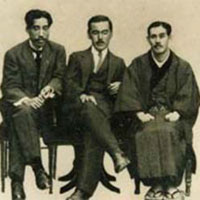 In the period 1916-1918 Yoshino presented his interpretation of the democratic ideology that would best suit Japan. From the outset, Yoshino's theory accepted the ‘realities’ of the situation- that is, he accepted the role of the Emperor within Japanese society and history, and thus attempted to construct a democratic theory around this symbol of divinity, much as had been done in the West in the links between Christianity and democracy. Applying his ‘minponshugi’ definition of democracy, Yoshino proposed that the centralised, sovereign and powerful position of the Emperor could be compatible with democracy as long as it was recognised that the role of the Emperor was to act in the best interests of the citizenry. For Yoshino, therefore, it did not matter where the sovereignty lay, but how it was to be exercised. Yoshino's view fulfilled the democratic aspirations of many Japanese (particularly students) and he was the first to reconcile the role of the Emperor in a democracy (fusing Orientalism with Western democratic theory). Yoshino obviously played a critical role in the development of Japanese democracy when other democratic movements lacked unity and direction, and his ‘heroic’ determination to preserve individual rights in a Japanese system that could have easily subordinated such democratic liberties is admirable.
In the period 1916-1918 Yoshino presented his interpretation of the democratic ideology that would best suit Japan. From the outset, Yoshino's theory accepted the ‘realities’ of the situation- that is, he accepted the role of the Emperor within Japanese society and history, and thus attempted to construct a democratic theory around this symbol of divinity, much as had been done in the West in the links between Christianity and democracy. Applying his ‘minponshugi’ definition of democracy, Yoshino proposed that the centralised, sovereign and powerful position of the Emperor could be compatible with democracy as long as it was recognised that the role of the Emperor was to act in the best interests of the citizenry. For Yoshino, therefore, it did not matter where the sovereignty lay, but how it was to be exercised. Yoshino's view fulfilled the democratic aspirations of many Japanese (particularly students) and he was the first to reconcile the role of the Emperor in a democracy (fusing Orientalism with Western democratic theory). Yoshino obviously played a critical role in the development of Japanese democracy when other democratic movements lacked unity and direction, and his ‘heroic’ determination to preserve individual rights in a Japanese system that could have easily subordinated such democratic liberties is admirable.
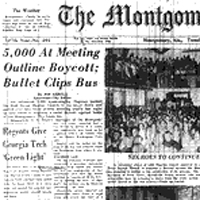 The extensive contributions of various individuals throughout history towards advancing democratic theory and rights have obviously been of monumental importance in the development of their respective democratic systems. The ability to overcome immense opposition, whether it be institutionalised racism as in the United States, or the divine position of the Japanese Emperor, all in the name and furtherment of democracy is indeed ‘heroic’, for the advantages that such individuals have assured for later generations of people are considerable, important, and reflect positive development and maturity in the ongoing history of the democratic system that may not have taken place without their contributions. Whilst a hero may also serve to uphold and strengthen principles of democracy by being represented as a symbol of ‘liberty and justice’ (for example George Washington or Abraham Lincoln in the United States), it is the initial achievements of the individuals and their input to the progress of democracy that is of most importance, and ultimately which has been so very necessary.
The extensive contributions of various individuals throughout history towards advancing democratic theory and rights have obviously been of monumental importance in the development of their respective democratic systems. The ability to overcome immense opposition, whether it be institutionalised racism as in the United States, or the divine position of the Japanese Emperor, all in the name and furtherment of democracy is indeed ‘heroic’, for the advantages that such individuals have assured for later generations of people are considerable, important, and reflect positive development and maturity in the ongoing history of the democratic system that may not have taken place without their contributions. Whilst a hero may also serve to uphold and strengthen principles of democracy by being represented as a symbol of ‘liberty and justice’ (for example George Washington or Abraham Lincoln in the United States), it is the initial achievements of the individuals and their input to the progress of democracy that is of most importance, and ultimately which has been so very necessary.
